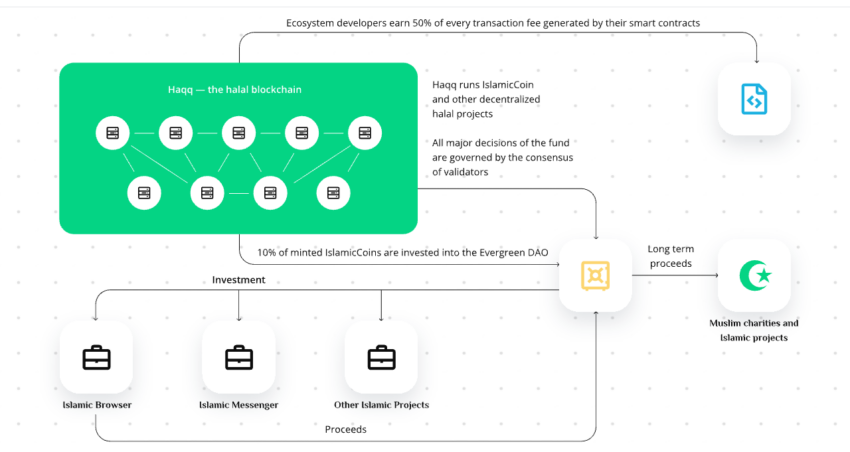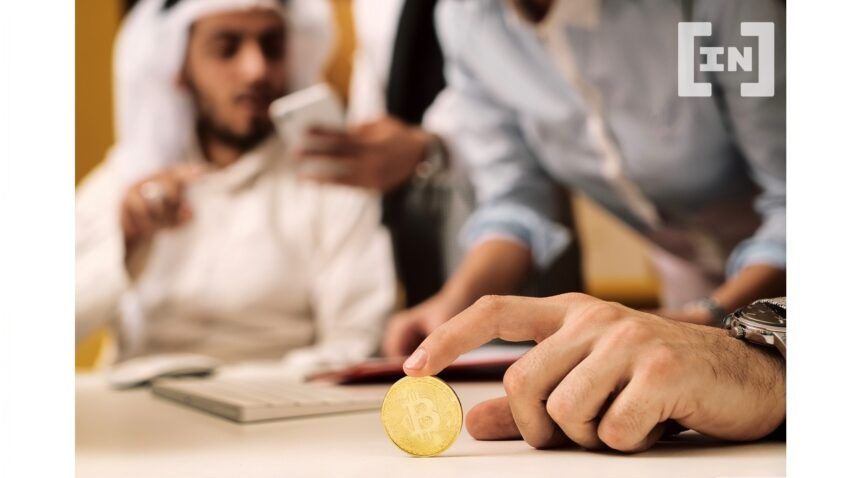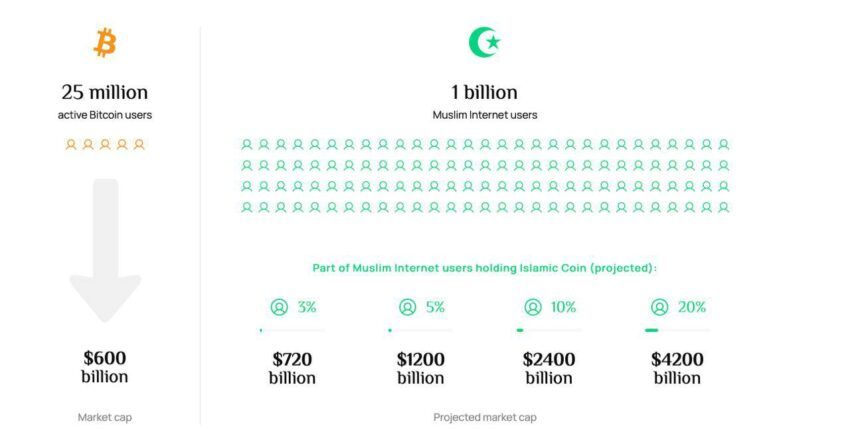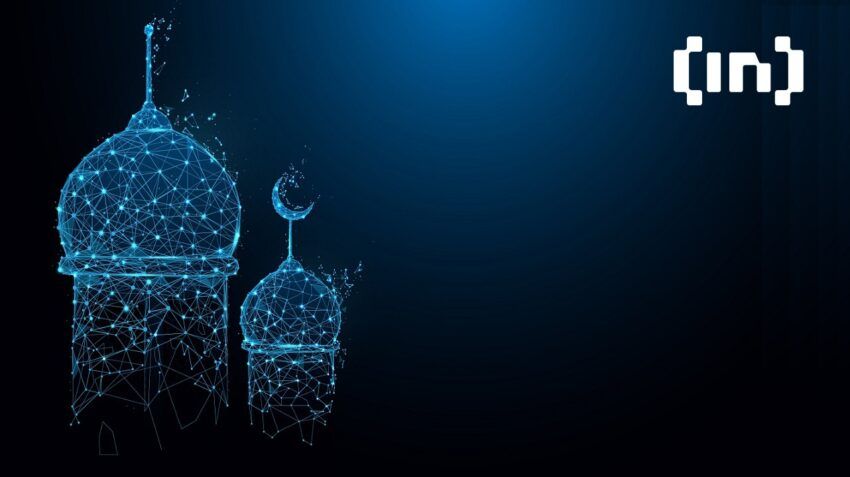Islamic Coin (ISLM) is an emerging cryptocurrency that complies with the rules of Shariah. The founders of the coin have made a wild claim. Their Muslim-focused asset could scale like Bitcoin (BTC) and hit the equivalent of more than $1 trillion in value.
“We know that the adoption will happen gradually,” Mohammed Alkaff Alhashmi, cofounder of Islamic Coin, told BeInCrypto. “However, if only 3-4% of the Muslim online community will hold Islamic Coin, it will become a bitcoin-scale crypto asset. It will generate a trillion dollars for its holders, and $100 billion for the Evergreen DAO,” he added.
The language sounds incredibly bombastic, if not unbelievable. That’s considering ISLM has not yet penetrated the market to the level of say Ethereum. ETH is the second-largest crypto asset with a market value of $157 billion in capitalization. And that’s not even mentioning Bitcoin.
It is not even listed on major exchanges just yet. But Alhashmi is confident of the product his company is building. He says they are playing the long game as they try to tap into the $2.88 trillion Islamic financial sector.
Islamic Coin: What is it?
According to Alhashmi, Islamic Coin is the native token of Haqq, the proof-of-stake (PoS) blockchain that operates on Cosmos via the EVMOS protocol. Translated as “truth” in Arabic, Haqq “stringently abides by Islamic views and traditions on finance.”
The idea behind the ISLM coin was to give the global Muslim faithful an instrument through which they could participate in the digital economy. Described as a Halal asset, Islamic Coin is said to be compliant to Shariah.
This means it conforms with the basic principles that guide Islamic life and by extension law, around issues of morality and modesty. Alhashmi said that the Islamic Coin was especially designed to facilitate philanthropic acts.
“Islam is the world’s second-largest religion with almost 2 billion followers: that’s roughly a quarter of the world’s population,” Alhashmi, a computer science engineer, told BeInCrypto.
“Muslims make up a majority of the population in 47 countries, we designed Islamic Coin to deliver a lasting, powerful impact for one of the largest communities in the world.”
Islamic Coin was launched on the Haqq blockchain in May. In June, the token got a religious declaration, or a “Fatwa”, from Muslim leaders. This confirmed that it met the religious standard that frowns upon issues such as gambling. Thus, Muslims were free to interact with the coin.
One month later, Islamic Coin raised $200 million in a private sale. This is a feat seen as remarkable in a bear market. The token is overseen by an executive board of prominent Islamic bankers, software engineers and scholars under the Swiss-based non-profit Haqq Association.
And yet. Something to consider is that people in the Middle East are loosening their ties to Islam, especially in countries such as Iran. Young people in particular are not identifying with the strict orthodoxies like they used to.
Islamic Coin tokenomics

According to the white paper, Islamic Coin’s supply is limited to 100 billion tokens. Every two years (called an Era), the coin’s emission rate is reduced by 5%. Emission will stop in 100 years from the first block of the first Era, it says. 20 billion tokens were minted in the genesis block.
Mohammed Alkaff Alhashmi said ISLM is used for payments, network governance, staking and to pay for costs of transacting over the network. “One of the most important purposes of ISLM is to power progress and charity work,” he stated.
Each time new coins are minted, 10% of the issued amount goes to Evergreen DAO, a non-profit “focused on long-term sustainability and community impact.” The coins are deposited into the DAO “to be invested into Islamic internet projects or given to Islamic charities.”
Between 1% to 5% goes to a block proposer and its delegators. The remainder is distributed proportionally to all bonded validators and their delegators. As a proof-of-stake asset, Islamic Coin uses a system of delegators of bonded validators.
These are rewarded in proportion to the amount of the ISLM tokens they have staked to help secure the network and process transactions. Rewards are distributed to the delegators less the validator’s own commission.
Holders of ISLM can lock their tokens by bonding them to validators in a process known as “staking.” By bonding coins, ISLM holders delegate voting power to validators and become delegators. This gives them the right to earn rewards and participate in governance.

Scaling Bitcoin-style
Alhashmi, the Islamic Coin cofounder, claimed that the crypto asset “is the first digital money that is Shariah-compliant, which can be used by Islam followers without any limitations.”
He sees a future where 3% to 4% of the existing one billion Muslim internet users adopt the Islamic Coin. The token would be in a position to scale like Bitcoin (BTC), the first and biggest cryptocurrency.
At 3% adoption, Islamic Coin would have a value of $720 billion in capitalization. The value would rocket to $4.2 trillion with a 20% rate of adoption, four times as much as the existing total global crypto market cap.

The token’s “immense potential is backed by the global influence of the Muslim world,” says the Islamic Coin website.
According to the Global Islamic Economy Report, the volume of the Islamic financial sector was $2.88 trillion in 2020 and is expected to grow to $3.69 trillion by 2024. This is led by growth digital technologies and mobile communications.
Alhashmi’s projections might be comparable to Willy Woo’s estimates of Bitcoin reaching one billion active users three years from now. But let’s put Islamic Coin’s market cap outlook into perspective with current metrics.
At a market capitalization of $1 trillion, Islamic Coin will have a value more than that of all the existing 19,000+ cryptocurrencies combined. According to Coinmarketcap, the global crypto market cap is $916 billion. This is down from a peak of over $3 trillion last November.
Bitcoin accounts for 40%, or $366 billion of that total. BTC is followed by Ethereum, Tether (USDT) at $68 billion, USD Coin (USDC) ~ $45 billion and Binance Coin (BNB) at $44 billion.
Shariah compliance
Shariah compliance is an important customer need and regulatory requirement in several Muslim markets. But the legitimacy of crypto assets such as Bitcoin remains a subject of great controversy.
Prominent Islamic leaders have labeled bitcoin as “haram.” This means that it is prohibited under Shariah law on the basis that the asset may be used for illegal activities like money laundering, gambling and fraud, which are forbidden by the Quran.
There is also some concern over a lack of central authority and how that digital currencies strip governments and central banks of their power over national monetary systems.
In November 2021, one leading Islamic scholar from Indonesia, Asrorun Niam Sholeh, issued a religious declaration, or fatwa. It warned followers against crypto investing saying, “it’s like a gambling bet.”
Ethics
Alhashmi and his co-founders believe that their project can play a part in ensuring that blockchain technology adopts a strong value system. “I believe that DeFi will benefit from taking on a system of values and some of this ethics,” he said.
“Shariah finance is based on ethics and values. Its financial school does not support interests, gambling, and so on. To ensure the compliance, every project goes through our Shariah board, which has more than 45 years of experience in Islamic finance.”
ISLM has started to receive support from powerful members of the Islamic community. Top Emirati Sheikh Khalifa Bin Mohammed Bin Khalid Al Nahyan was recently added to the Islamic Coin advisory board.
Cofounders include Hussein Mohammed Al Meeza, Mohammed Alkaff Alhashmi, Andrey Kuznetsov and Alex Malkov.
Will Islamic Coin be the next Bitcoin? Or will it slide into anonymity like the thousands of other crypto hopefuls? Let’s watch this space.
Got something to say about Islamic Coin or anything else? Join the discussion in our Telegram channel. You can also catch us on Tik Tok, Facebook, or Twitter.
Disclaimer
In adherence to the Trust Project guidelines, BeInCrypto is committed to unbiased, transparent reporting. This news article aims to provide accurate, timely information. However, readers are advised to verify facts independently and consult with a professional before making any decisions based on this content. Please note that our Terms and Conditions, Privacy Policy, and Disclaimers have been updated.

